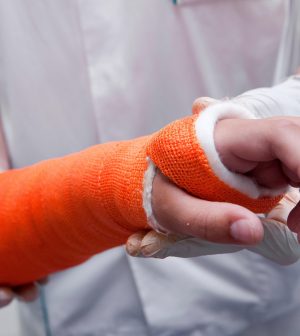- Could Your Grocery Store Meat Be Causing Recurring UTIs?
- Are You Making This Expensive Thermostat Error This Winter?
- Recognizing the Signs of Hypothyroidism
- 10 Strategies to Overcome Insomnia
- Could Artificial Sweeteners Be Aging the Brain Faster?
- Techniques for Soothing Your Nervous System
- Does the Water in Your House Smell Funny? Here’s Why
- Can a Daily Dose of Apple Cider Vinegar Actually Aid Weight Loss?
- 6 Health Beverages That Can Actually Spike Your Blood Sugar
- Treatment Options for Social Anxiety Disorder
How Ice & Snow Can Harm Your Wrists, Hands

Winter’s icy beauty can also be dangerous.
An orthopedic expert offers some tips for avoiding serious injuries on slippery ground or hazards hidden by snow.
“When people have injuries during the winter, it commonly involves tripping over an object or slipping on ice,” said Dr. Richard Samade, an assistant professor of orthopedic surgery who specializes in hand and upper extremity surgery at UT Southwestern Medical Center in Dallas.
“To protect themselves from greater injuries, people will instinctively stretch their hand and arm out to break their fall,” Samade said in a center news release. “Unfortunately, this leads to a decelerating force concentrated through the wrist, forearm and elbow that often leads to injury in the small bones of those areas.”
Staying alert and aware of surroundings can help.
People should take note of dark patches on pavement that may be iced over, Samade advised.
Wear appropriate footwear with good traction, he said.
If you use a walker or cane, consider having someone walk with you in case you lose your balance.
Of course, it’s important to stay safe year-round. Pay attention to what’s ahead of you while walking rather than texting or looking down at a phone screen, Samade suggested.
Use corrective lenses or walking aids if poor vision, chronic conditions and medication have increased your fall risk.
In warmer months, outdoor work and recreational activities can lead to hand or wrist injuries. These include gardening, construction, bicycling and sports, as well as collisions and falls.
Always ensures that ladders and other elevated locations are secured, Samade said. Carefully watch roads, sidewalks and cycling paths to avoid hazards that can cause loss of control.
With age, injuries from a fall can be more severe. Bone density decreases, which makes fractures more likely, Samade explained.
Ensuring appropriate calcium and vitamin D intake and avoiding smoking can help minimize these issues.
Getting good care to treat your injury is critical to prevent future complications or a worse injury, Samade said.
More information
The U.S. National Institute on Aging has more on falls and fractures in older adults.
SOURCE: UT Southwestern Medical Center, news release, Feb. 1, 2023
Source: HealthDay
Copyright © 2026 HealthDay. All rights reserved.










